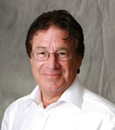
Richard D. Klausner
Thursday, 19 November 2009 at 18:00 in the Print Media Academy, Kurfürstenanlage 52-60, Heidelberg
Mit freundlicher Unterstützung der Manfred Lautenschläger Stiftung in Zusammenarbeit mit dem Netzwerk Alternsforschung
Richard D. Klausner, The Column Group
Science in Global Development and International Relations
Abstract
The unprecedented improvements in life as measured by life span, wealth and the spread of wealth over the last two hundred years has been driven, in large part, by the exponential changes brought about by science and technology. Accompanying these changes has been an accelerated spread of the fruits of technology across the globe driven by science created revolutions in transportation and communication. Despite the beneficial effects of science, three types of problems continue to confront the world: gapping disparities between the haves and have-nots; conflicts within and between countries and with non-state players; global threats to health and the environment. Each of these has been influenced (or even determined), to a greater or lesser extent, by the science and technology that has driven so many aspects of modernity.
Given this last fact, one may ask to what extent we can look to science and technology for solutions to disparities, conflict and global threats? As a scientist, physician and one-time government official, I have struggled with just that question. From running the world’s largest public research organisation (the US National Cancer Institute) to helping direct the world’s largest philanthropy (The Bill and Melinda Gates Foundation) to global volunteerism, I will explore anecdotes and views of how science and technology can and must be directed to address disparities, engage the politics of conflict and prevent global threats. This is neither politics nor science, neither the politicisation of inquiry nor the rationalisation of politics. Rather it is about the emergence of a stance of global responsibility of the global enterprise of science.
Biography
Dr. Richard Klausner formerly served as the director of the National Cancer Institute (NCI), where he led one of the world's largest research and health agencies, creating successful national and international programs aimed at applying science and technology to improving the public health. Following his service at the National Cancer Institute Dr. Klausner was the global health executive director of the Bill and Melinda Gates Foundation's Global Health programme, whose overarching goal is to improve global health equity.
Dr. Klausner is currently a managing partner of The Column Group, a strategy-based venture fund. In addition, Dr. Klausner serves as an advisor to the Prime Ministers of India and Norway.
Dr. Klausner is well known for his work in cell and molecular biology. He has served as chief of the cell biology and metabolism branch of the National Institute of Child Health and Human Development. He has served on numerous advisory committees and is the past president of the American Society for Clinical Investigation. He is the author of more than 300 scientific articles and several books, and has received numerous awards and honours. Dr. Klausner has served as a senior fellow at the National Academies of Science, advisor to the presidents of the Academies for counter-terrorism, and liaison to the White House Office of Science and Technology Policy. In addition, Dr. Klausner led the efforts of the National Academies of Science to write standards for science education for the United States. He is a member of the National Academy of Sciences and the Institute of Medicine and the American Academy of Arts and Sciences.